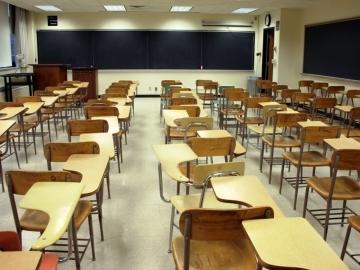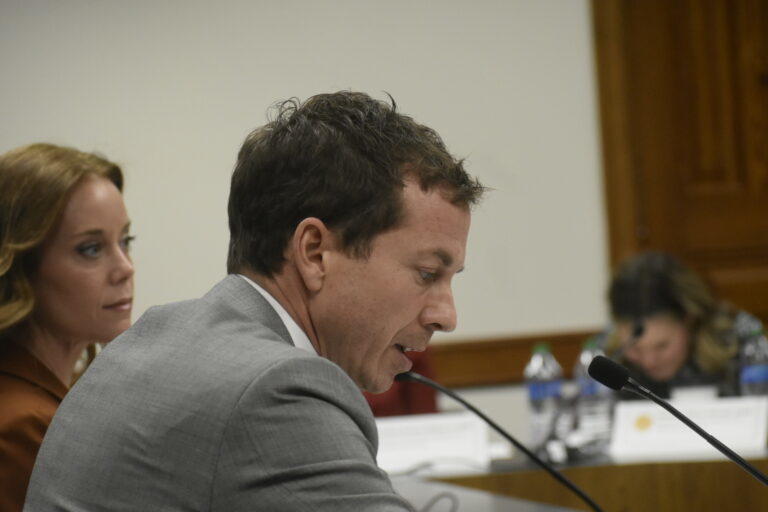
Caption
Georgia public school families could get $6,000 to send their children to private school, but educators worry diverting funds from public classrooms will leave children behind.
Credit: GPB/File

Georgia public school families could get $6,000 to send their children to private school, but educators worry diverting funds from public classrooms will leave children behind.
A new school voucher bill passed out of a Senate committee Tuesday and could be headed for a full Senate vote.
Senate Bill 233, authored by Cumming Republican Greg Dolezal, would allow the parents of nearly all of Georgia’s nearly 1.7 million public school students to pull their children out of class in exchange for an annual $6,000 scholarship to a private school.

Sen. Greg Dolezal presents his school voucher bill to the Senate Education and Youth Committee.
“What we see when we look at other states where programs like this have been implemented, it has lifted the outcomes for not only those whose parents decided to seek an educational opportunity for them outside the public school, but it has actually lifted outcomes … to those who remained in the public school system,” Dolezal said at a meeting of the Senate Education and Youth Committee Tuesday.
Republican-led states around the country have been working to implement voucher programs; Iowa and Utah passed sweeping voucher bills last month, and Georgia lawmakers have pushed similar bills for years.
Proponents say these bills empower parents whose local districts are not meeting their children’s needs. Opponents say they funnel public school funds into private institutions without government oversight.
Lisa Morgan, president of the Georgia Association of Educators and a kindergarten teacher, said the Legislature would better serve Georgia students by setting aside more of its spending for students living in poverty.
“Six thousand dollars is less than half of the average private school tuition in this state,” she said. “So my students who are 100% free-and-reduced lunch, who are unable to come to school without school bus transportation, and who are unable to remain after school for (tutoring) without school bus transportation home, in no reality would this, quote, ‘scholarship’ provide them an opportunity to attend any school other than our public schools.”
The average private school tuition in Georgia is $11,541 per year, according to Private School Review, and prices range from $1,042 to over $57,000.
Dolezal said the voucher amount was set to $6,000 because that is about 10% lower than the average amount the state spends on each student per year, which he said would mean each student who participates would lower spending for the state than if he or she stayed in public school. The program would only be funded if the state fully covers its share of per student spending known as Quality Basic Education.
Dolezal cited a study by state economist Jeffrey Dorfman:
“I reviewed that study today,” he said. “Of the 181 systems, 176 actually will have their per capita amount of funding increase because the local money stays in that district under a program like this with the $6,000 number.”
Stephen Owens, education director at the Georgia Budget and Policy Institute, said that math doesn’t add up.
“That only makes sense if enough students leave to actually lower the cost for the school,” he said. “And I think it’s important to recognize that lowering the costs of the school means firing teachers, because we know the vast majority of dollars that go into a school are spent directly into a classroom.”
A student transferring out would cost the school that portion of the student’s share of state funds, but would not equally lower the school’s costs, he said.
“You can’t lower the air conditioning by two students’ worth, and you can’t cut two seats off a school bus,” Owens said. “So it’s just additional costs for the local school and kind of a handout to the private schools that come with very little expectations of how they are supposed to use it.”
If 1% of Georgia’s public school students took advantage of the program, more than $101 million would be diverted from state school funds.
The bill requires participating students to be enrolled in public school, so private school families could not use vouchers as a coupon to send their children to the same school they were already attending. It includes exemptions including for students in schools run by the state Department of Juvenile Justice, those who are not citizens or permanent resident aliens and students who have been convicted of certain drug-related felonies.
To participate, parents would need to submit an application to the Georgia Student Finance Commission. If they are accepted, they would receive quarterly payments in a special account which can only be used on qualified educational expenses. A committee of eight parents appointed by the head of the commission would be in charge of determining which expenses would qualify.
The bill is nearly identical to one that was shot down in the Senate last year, with a few differences. Language requiring participating schools to employ teachers with a bachelor’s degree or other credentials was removed.
“That’s something that I think worries a lot of parents in Georgia, which is we have a standard for who’s going to be watching over their kids inside the public school,” Owens said. “Is that the same standard that the private school is going to be held to? And if not, why are we kind of lowering the level of safety for our children to advance a private school voucher bill?”
This story comes to GPB through a reporting partnership with Georgia Recorder.
